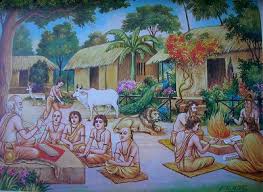Apprenticeship and internship are very old systems that could be seen in Ramayana. The style and words would differ, being in Sanskrit language.
The period of learning the work was called as the apprenticeship. Prior to the actual work, the teacher used to orally tell the verses and the disciple had to by heart them. When the disciple performed the works, the teacher would correct him in case mistakes had been committed. The case of Shunashepa and Vishwamitra could be stated as one of the examples for the apprenticeship in Ramayana.

King Ambarisha had purchased Shunashepa for sacrificing the boy in a ritual. The king had searched for many months to get that living boy for cutting his head and offering to fire in oblation. The boy had agreed to go with Ambarisha, otherwise he would starve due to hunger and die. The king tempted him with food and assured his desired food, till his life was put in sacrifice. Shunashepa, the boy, felt if God had created him, he would protect him also. His will and desire was strong, but he could not afford education.
Vishwamitra Rishi was a king once with name Kaushika and by penance, started to lead a life of seers. He consulted Parasurama and desired to eradicate sacrifice of innocent human beings but didn’t tolerate the erring kings. Shunashepa was entrusted to Vishwamitra to carry to the palace of Ambarisha and prepare him for the sacrifice. Vishwamitra Rishi had openly agreed with the king. The king left for his palace and prepared for the sacrifice altar and the post for tying, prior to cutting the head of Shunashepa. Vishwamitra Rishi treated him sympathetically. He wanted to satisfy both persons, Ambarisha and Shunashepa.
Vishwamitra Rishi had taught him two verses or say Mantras. One is called Gayatri mantra and the other one is called Mrityunjaya Mantra.
शुनःशेपो गृहीत्वा तु द्वे गाथे सुसमाहितः । त्वरया राजसिम्हं तमंबरीषमुवाच ह ॥
Meaning: After receiving the two mantras, he had learned to recite them orally with sufficient clarity. In the following day, prior to the sacrificing time, he reported to the lion-like appearing king Ambarisha, as he was ready then.
Vishwamitra Rishi had covered the face of Shunashepa fully with Darba grass, adjusting the sharp edges extra extending over his head. When the call for cutting the head was uttered, Vishwamitra Rishi had cut few pieces of the end of the Darba grass without harming the body of the boy and put them into the fire. The Rishi was physically strong and nobody could dare to speak with him, about his works, during the rituals. King Ambarisha was happy and finished his sacrificial rituals and people then disbursed to their respective houses. Poor Shunashepa was alive but he had nowhere to go. Vishwamitra Rishi sympathetically provided him food and shelter. He had accepted him as his apprentice and provided him suitable knowledge of workmanship required for his future life.
Vishwamitra Rishi succeeded in eradicating human sacrifice system and had become Brahmarshi. The Gayatri mantra and Mrityunjaya mantras are still used by people for better life which were the contributions of Vishwamitra Rishi.
The learning period of risk was called as the internship. Prior to the actual operations the teacher used to orally tell the verses and the disciple had to repeat them by heart as understood in his memory. When the student would perform the proceedings of the risky tasks, the teacher would supervise his actions in site and would guide the case till they had been completed successfully. The case of Rama, Lakshmana and Vishwamitra could be stated as one of the examples for the internship in Ramayana.
King Dasharatha had sent Rama and Lakshmana for assisting the Rishi in his routine rituals. The king Dasharatha first hesitated, but on advice of Vasishta, agreed to send his children with Vishwamitra. The boys had agreed to go with Vishwamitra; otherwise they would be deprived of opportunities to learn the risks of kingly life. The Rishi assured them temptations of Bala and Atibala, special branches of knowledge by which they could overcome human demand for food, and really granted food and shelter. He assured them their desired passionate stories also.
On the first day evening, after crossing the Sarayu River, on the southern side, the Bala and Atibala had been learned, after the evening prayers. In the night, they reached the Ashram of Vishwamitra Rishi and slept inside the Ashram.
कौसल्या सुप्रजा राम पूर्वा संध्या प्रवर्तते । उत्तिष्ठ नरशार्दूल कर्तव्यं दैवमाह्निकम् ॥
Meaning: O Rama, the best son of Kausalya, on the eastern horizon, the morning had started. O brave man, please get up. Divine routine oblations are to be offered.
Vishwamitra Rishi had awakened the boys, Rama and Lakshmana, as above, on the following day at his Ashram to continue their internship in administration.
श्रीमद् वाल्मीकि रामायणे बालकाण्डे । त्रयाधिकविंशतिः सर्गे श्लोकं द्वितीयकम् ॥
Meaning: It is the second verse in the Srimad Valmiki Ramayana, in Balakanda, under the twenty third sarga. This is originally written by Valmiki Maharshi.
Vishwamitra Rishi had succeeded to lead his life as Brahmarshi. Even though Vishwamitra Rishi had once been an efficient king, after accepting the laurel as Brahmarshi, he had abandoned violence and could not kill anybody. Though demons like Tataka teased him, he could provide internship to Rama and Lakshmana and guide the war operations, but personally he would not use weapons.
Sanskrit language would continue in this country forever but it would sometimes diminish and in other times flourish, just like black moon and full moon days.
The benefit of apprenticeship and internship could be well understood during the establishment of four Shankaracharya orders of Peethas at four places in this country. This had upheld the path of Dharma of a founder less religion.
It is humbly prayed for the blessings of God Rama upon us.
Next post, being Healthy Human Habits may not be missed.
Nandadeepa means ever glowing lamp, would be presented separately in another article.
Readers may provide feedback and share this story with friends and family.

A very nice piece of article worth reading and keep it tagged.
an.nagaraj1954@gmail.com
Thanksgiving 😃